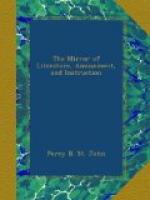Ay, madam,
Full oft; and in each calm or frightful
guise
Death comes in,—on the bloody
battle-field;
When with each gush of black and curdling
life
A curse was uttered,—when the
pray’rs I’ve pour’d,
Have been all drown’d with din of
clashing arms—
And shrieks and shouts, and loud artillery,
That shook the slipp’ry earth, all
drunk with gore—
I’ve seen it, swoll’n with
subtle poison, black
And staring with concentrate agony—
When ev’ry vein hath started from
its bed,
And wreath’d like knotted snakes,
around the brows
That, frantic, dash’d themselves
in tortures down
Upon the earth. I’ve seen life
float away
On the faint sound of a far tolling bell—
Leaving its late warm tenement as fair,
As though ‘twere th’ incorruptible
that lay
Before me—and all earthly taint
had vanish’d
With the departed spirit.
Laval returns from Italy to claim his bride. In the earlier part of the play, a hint is given of Gonzales’ rancorous hate of Laval, the undercurrent of which is now revealed. Gonzales, beneath the seal of confession, obtains the secret of the crime of Francoise. In her presence, as the betrothed Laval rushes to embrace his bride, he taunts him with her guilt. The wretched Francoise, in vain conjured to assert her innocence, stabs herself. The King had been followed thither by the Queen; both now appear. Gonzales riots revenge in one of the most vigorous portions of the drama:
GONZALES.
Look on thy bride! look on that faded
thing,
That e’en the tears thy manhood
showers go fast,
And bravely, cannot wake to life again!
I call all nature to bear witness here—
As fair a flower once grew within my home,
As young, as lovely, and as dearly lov’d—
I had a sister once, a gentle maid—
The only daughter of my father’s
house,
Round whom our ruder loves did all entwine,
As round the dearest treasure that we
own’d.
She was the centre of our souls’
affections—
She was the bud, that underneath our strong
And sheltering arms, spread over her,
did blow.
So grew this fair, fair girl, till envious
fate
Brought on the hour when she was withered.
Thy father, sir—now mark—for
’tis the point
And moral of my tale—thy father,
then,
Was, by my sire, in war ta’en prisoner—
Wounded almost to death, he brought him
home,
Shelter’d him,—cherish’d
him,—and, with a care,
Most like a brother’s, watch’d
his bed of sickness,
Till ruddy health, once more through all
his veins
Sent life’s warm stream in strong
returning tide.
How think ye he repaid my father’s
love?
From her dear home he lur’d my sister
forth,
And, having robb’d her of her treasur’d
honour,
Cast her away, defil’d,—despoil’d—forsaken—
The daughter of a high and ancient line—
The child of so much love—she




